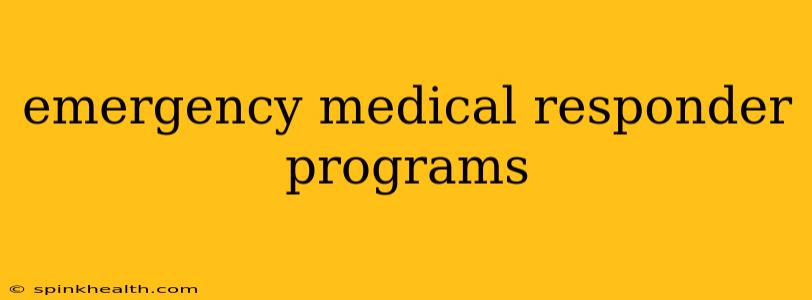The siren wails, adrenaline surges, and you're rushing to help. This isn't a scene from a movie; it's the reality for Emergency Medical Responders (EMRs), the first link in the chain of survival. If you're drawn to this high-stakes, life-saving profession, understanding the various Emergency Medical Responder programs is crucial. This journey begins with choosing the right path—a path that can lead to a rewarding career dedicated to helping others in their most vulnerable moments.
What is an Emergency Medical Responder (EMR)?
EMRs are the frontline medical personnel who arrive first at emergency scenes. They provide immediate, life-saving care before more advanced medical professionals, like paramedics or EMTs, arrive. Think of them as the critical first responders, often the difference between life and death in those crucial first few minutes. Their role is vital, bridging the gap between immediate need and advanced medical intervention. They are trained to handle a range of emergencies, from car accidents and heart attacks to strokes and traumatic injuries.
What are the Different Types of Emergency Medical Responder Programs?
There isn't a single, standardized EMR program across the globe. Training varies depending on your location and the certifying agency. However, most programs share core competencies, including:
- Basic Life Support (BLS): This is the foundation of any EMR program. You'll learn CPR, airway management, and how to control bleeding.
- Trauma Care: Understanding how to assess and treat injuries from accidents and other traumatic events is a vital part of the training.
- Medical Emergencies: Recognizing and responding to conditions like heart attacks, strokes, and seizures is crucial.
- Emergency Scene Management: Learning how to safely assess a scene, manage bystanders, and communicate effectively with dispatch is essential for EMRs.
Many programs are offered through:
- Community Colleges: These often offer affordable and accessible EMR programs.
- Vocational Schools: Specialized schools focus intensely on practical skills and hands-on training.
- Hospitals: Some hospitals offer their own in-house EMR training programs.
- Fire Departments and EMS Agencies: Many emergency services organizations offer training programs for their own personnel.
What Certifications are Available for EMRs?
Certification varies by region and certifying body. However, most programs lead to a nationally recognized certification, often involving a written exam and practical skills assessment. These certifications demonstrate your competency and allow you to practice as an EMR.
How Long Does it Take to Become an EMR?
The duration of EMR programs typically ranges from a few weeks to several months, depending on the program's intensity and the amount of practical training included. Some programs can be completed part-time, making them accessible to individuals with other commitments.
What are the Job Prospects for EMRs?
EMRs are in high demand across various sectors:
- Emergency Medical Services (EMS): This is the most common employment path for EMRs.
- Hospitals: Hospitals often employ EMRs to assist in emergency departments or transport patients.
- Fire Departments: Many fire departments integrate EMRs into their teams.
- Private Ambulance Services: Private ambulance companies frequently hire EMRs.
What are the Career Advancement Opportunities for EMRs?
Completing an EMR program is often a stepping stone to further medical training. Many EMRs progress to become Emergency Medical Technicians (EMTs) or even Paramedics, expanding their skills and responsibilities.
How Much Does an EMR Program Cost?
The cost of an EMR program varies considerably, depending on the institution, location, and program length. Factors such as tuition fees, textbooks, and supplies can all impact the overall cost. Investigating financial aid and scholarship opportunities is advised.
Is an EMR Program Right for Me?
Becoming an EMR is a demanding yet incredibly rewarding path. If you possess a strong sense of compassion, a desire to help others, and the ability to remain calm under pressure, this career path may be an excellent fit. The satisfaction of making a tangible difference in people's lives is a powerful motivator for those dedicated to this profession. The first step is researching programs in your area and exploring the specific requirements and career paths available to you. Your journey to becoming a lifesaver starts with a single, determined step.

